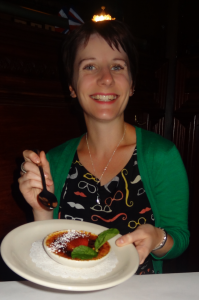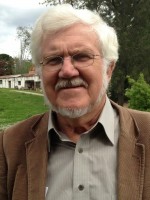 Gaiutra Bahadur is an award-winning American journalist and book critic. She is the author of Coolie Woman: The Odyssey of Indenture (HURST, 2013). Her essays, criticism and journalism have appeared in The New York Times Book Review, The Washington Post, The (London) Observer, The Nation, History Today, The Virginia Quarterly Review and Ms. Magazine, among other publications.
Gaiutra Bahadur is an award-winning American journalist and book critic. She is the author of Coolie Woman: The Odyssey of Indenture (HURST, 2013). Her essays, criticism and journalism have appeared in The New York Times Book Review, The Washington Post, The (London) Observer, The Nation, History Today, The Virginia Quarterly Review and Ms. Magazine, among other publications.
She writes frequently about literature, gender and migration and has reported from the Middle East, the Caribbean, the United Kingdom and India. She’s a graduate of Yale and the Columbia Graduate School of Journalism and was a Nieman Fellow at Harvard during the 2007-2008 academic year. When she was six years old, her family immigrated to the United States, to the New York City area, from Guyana, the only country in South America that was once a British colony.
In 2013, Gaiutra won awards from the New Jersey State Council on the Arts and the Barbara Deming Memorial Foundation, the national feminist arts organization, both on the merits of the manuscript for Coolie Woman. The book was published in 2013 to critical acclaim in the U.S., U.K., India and the Caribbean. It was a finalist for the UK’s prestigious Orwell Book Prize, for political writing that is artful, and won the 2014 Gordon K. and Sybil Lewis Prize, awarded by scholars of the Caribbean to the best book about the Caribbean published in the previous three years. Coolie Woman was also one of three nonfiction finalists for the Bocas Prize for Caribbean Literature.
Extracts from Coolie Woman, The Odyssey of Indenture
from PART ONE, EMBARKING
1.
THE MAGICIAN”S BOX
… I was almost seven, old enough to have memories of Guyana and young enough to be severed in two by the act of leaving it. Emigrating was like stepping into a magician’s box. The sawing in half was just a trick. In time, limbs and coherence would be restored, and a whole, intact self sent back into the audience. But at my age, unformed and impressionable, I didn’t know that. All I knew was that everything seemed to split apart. Time became twofold, divided into the era BA, or before America, and the one after it, after 7 November 1981. Space was also sundered, torn slowly and excruciatingly into two conflicting realms, inside and out.
My memories of Guyana are almost all set outdoors. The houses there stand on stilts, to avoid the flood underfoot. That kicks open, underneath, a concrete terrain known as the Bottom House. There, curries are cooked and eaten, laundry washed and set to dry. There, life unfurls, exposed to the eyes of the lane, open to the comment of neighbors. And there, visits are paid. Hammocks rock back-and-forth, marking the absence of time, as hours pass in gyaffing, a West Indian brand of aimless talk, encompassing everything and nothing at once.*
I remember the outside of our house in Cumberland Village much better than the inside. The Bottom House opened into the front yard, where we posed for our photo that last day. To the left stood our guinep tree, the scant, sweet pulp of its fruit encased in a green shell. To the right stood our concrete temple, the size of a toolshed. It lay outside the frame of that final picture, but I remember it vividly. The mandir was honeycombed for ventilation and painted as blue as the clay gods within. It sat next to my grandmother’s garden, where so many times, zinnias tucked into our braids, sheets wrapped like saris around our waists, my cousin and I played at being brides. We staged our weddings in and around a curvaceous blue car parked inside the gate. It belonged to Brudda, a taxi-driving cousin renowned for his ability to squeeze in a dozen passengers in any one go. The car had died and, for some reason, Brudda had laid it to rest under the guinep tree. Three decades later, Brudda is in Canada, and we are in America; but the remains of the car still lie there, an indestructible shard of blue in the weeds choking our abandoned plot of Guyanese earth. The temple, the garden and the car comprise the hazy landscape of my first childhood, like stickers pasted onto a board-game map of the past. Flat, but brightly colored, they represent what was, in the wide-open place we left behind.
In the America we arrived in, it was too cold for all that. Our aunts gave me and my cousin matching grey winter coats. We wore them through our first season of snow. We learned how to speak and shoved indoors the Creole words that vibrated with Bottom House and playmates. There wasn’t much extra room for those words in the close spaces of our new life, on the first floor of my uncle’s house in New Jersey. We rented three tight rooms and slept five in a row, on two beds pushed together, for half a decade. My grandmother, who had crossed a border crawling on her belly to join us by then, made the fifth. From the fire escape, we could see the Twin Towers. Despite the panoramic view of Manhattan, our apartment promoted claustrophobia. The door swung into the windowless bathroom to reveal my mother balanced on the edge of the bathtub, attacking clothes in sudsy water, pummeling hand-me-down jeans until they screeched, beating the ugly green corduroys that made me look as awkward as I felt. She nearly fainted once, with the fumes of Clorox bleach concentrated in that tiny room.
The gods were also crowded; they, too, had been forced inside. From the airy temple perfumed by zinnias, they were driven into the closet—the linen closet in the bedroom, to be precise. There was a box of Barbie dolls on the bottom shelf, and nightly, the rats made incisions into the pale plastic of their perfectly formed legs. On the top shelf rested framed prints of the gods: elephant-trunked Ganesh, the remover of obstacles; Hanuman, the monkey with a mountain in his palm; and Sarasvati, the goddess of knowledge.
—–page 4-5
2.
ANCESTRAL MEMORY
Our journey took us past endless fields of flowering yellow along the northern banks of the Ganges. When we pulled into towns, we asked for directions, from children balancing loads three times their size on their heads, from crouching women tending baskets of cauliflower and eggplant by the roadside, from men in the stores that stared open-faced onto the street, framing a tailor at his sewing machine, a man pumping air into bicycle tyres, a camera-wallah behind his counter. We sought the guidance of random people on the route, turning to them as to a massive human compass. And they obliged. They pointed us along bumpy roads bracketed by tiny pastel altars made to worship the sun, until one man finally indicated a rocky path. “That way,” he said.
We had travelled five hours over shell-shocked roads and narrow dirt lanes to arrive here, at the threshold of a place I wasn’t even sure still existed. It did a century ago. That’s what a document that I had discovered two years earlier, in Guyana’s national archives, indicated. It was the emigration pass issued to my great-grandmother on 29 July 1903, the day she sailed from Calcutta for the Caribbean.
Catalogued on this brittle artifact, sepia and crumbling with age, was everything about Immigrant #96153 that the imperial bureaucracy had considered worth
recording: “Name: Sheojari.” “Age: 27.” “Height: five-feet, four-and-a-half inches.” “Caste: Brahman.” Here was colonial officialdom’s cold summary of an indentured laborer’s life. Yet, it included strokes of unsettling intimacy. The emigration pass told me that my great-grandmother had a scar on her left foot, a burn mark. Someone had scribbled “Pregnant 4 mos” in pencil at the document’s edge. On the line for husband’s name, there was only a dash.
Though my great-grandmother claimed no husband, she did list coordinates for home. The pass pointed to it precisely, almost like a map to some mythic location with hidden riches. X marks the spot: the state of Bihar, the province of Chhapra, the police district of Majhi and the village of Bhurahupur. There the past rested, buried. And here we were, just a few miles away, more than a century later, hoping to excavate lost history. Bihar isn’t a place where people typically go in search of buried treasure. Outsiders typically don’t go there at all, although it’s the second most populous state in India. The few foreign tourists it attracts are on Buddha’s trail, making pilgrimage to the place where he attained enlightenment. Bihar was once the seat of a vast and ancient empire stretching to Iran, but few people see it now as anything but a corrupt and dangerous backwater. Its per capita income is among the lowest and its illiteracy rate among the highest nationwide. One historian has branded the state “a stinking skeleton in India’s democratic cupboard.”1
It was November 2005, four days before provincial elections—a bad time to be travelling in Bihar. Ballot boxes had been stolen at gunpoint in the past. And Marxist rebels had just broken out of a jail south of the capital, Patna, when we set out. The military had been ordered to keep civilian vehicles off the roads until the votes had been cast. One of my guides decided we would pose as journalists to get past the roadblocks. He taped a phony “PRESS” sign onto the windshield of our white Ambassador. This voluptuous vintage car is a relic from the pre-globalized era when Indians drank Thums Up instead of Coca-Cola, and its presence everywhere on Bihar’s potholed highways was another sign that the sleek, new India of nanos and glimmering shopping malls has not reached all corners of the subcontinent. Surprisingly, our Scotch-taped stratagem worked. Soldiers in khaki fatigues stopped us, but they did not ask for credentials. They took us at our word.
My guide Abhijit eyed the rocky little lane that stood between me and my great-grandmother’s village. It seemed impossible that the massive Ambassador could force its way through. He chuckled. “That’s a great scene, just like Veer Zara,” he said, with a sudden, sarcastic edge. “Preethi Zintha is searching for her forefathers.” He was referring to a Bollywood movie that had cast its dimpled starlet along village backroads in search of a lost love—not lost forefathers. But the imprecision of the analogy seemed somehow appropriate to my journey. Ancestral memory had told my family the story of who we are: brown-skinned people with many gods and peculiar, stubborn habits. It had told it imperfectly. Memory, after all, fails us. That we expect, especially over generations and across oceans. Details get smudged, and dialogue garbled. The will to remember the past is undermined by an equally formidable will to forget. Given how facts had fared with the passage of time, how could I do anything but fumble my way inaccurately through India? I had to rely on Abhijit to name things like the yellow fields, and the comedy was unavoidable. “Is it saffron?” I asked. Yes, he said—though saffron does not grow anywhere near this corner of the subcontinent, and those stalks were mustard.
We arrived at the village in the late afternoon, an hour before the winter sunset, and we had to be back in Patna by bedtime. Our time was limited. My second guide, Jitendra—a man with a face so straight and correct it could have been drawn with a protractor—took charge. He did not ask anyone about Sujaria. There would have been no point, he assured me. “Women,” he explained, “were not known persons at the time.” Instead, he dropped the name of Sujaria’s father: Mukhlal. It was listed on her emigration pass, along with a next-of-kin, a female cousin. Armed with this information, Jitendra approached a group of men loitering near the entrance to the village, off a gravel lane, along a tributary of the Ganges. He asked if anyone knew of a Mukhlal who had lived in Bhurahupur a century ago. No one did.
The villagers took us to a toothless man with a helmet of white hair, sitting on a bench outside his house, a mustard shawl draped over his bony body. He was a schoolteacher and an elder, the kind of man you might expect to be the keeper of local memory. He had, however, no information. My heart sank a little, although I wasn’t expecting anything concrete from this trip. I hadn’t even known whether or not the village would still be standing. I couldn’t really believe I was here. In Bhurahupur. X marks the spot. The precise point where an umbilical cord connected me to India. And here I was, being sized up by a curious crowd of real-life men who called it home.
“Alright,” I told Jitendra. “I just want to ask some general questions about the village. Can we do that?”
The schoolteacher called for three chairs, and we sat.
“Go ahead,” Abhijit snapped. “Ask your questions.”
It was my turn to speak, and I didn’t know where to start.
“My great-grandmother left this village,” I ventured, throat tight, conscious that our entire impromptu entourage was looking and listening. I turned to Abhijit, waiting for him to interpret my words into Bhojpuri, the dialect spoken in the district, but he was mute. Jitendra, thankfully, stepped into the breach. Though he spoke less English than Abhijit, he understood much better what I was after and how to help me get it.
The schoolteacher listened, his eyes on me, on the long white kurta I wore over red tapered leggings and on my hair, loose and tangled from the bumpy ride and contradicting my traditional dress. He fixed me in one penetrating gaze and pronounced: “You should be living here.” It was delivered like a reproach. India’s diaspora, now at 17 million worldwide, has quit India’s borders despite a prejudice with the force of religion behind it. To leave was to cross the kala pani, “the dark waters,”* of the Indian Ocean and therefore to lose caste, according to the strictures of Hinduism.
——pages 17-19
These two extracts are reprinted from Coolie Woman, The Odyssey of Indenture, Hurst and Co, London, 2013
 Alyson Miller teaches literary studies at Deakin University, Geelong. Her short stories and prose poems have appeared in both national and international publications. Her collection of prose poems, Dream Animals, is forthcoming with Dancing Girl Press.
Alyson Miller teaches literary studies at Deakin University, Geelong. Her short stories and prose poems have appeared in both national and international publications. Her collection of prose poems, Dream Animals, is forthcoming with Dancing Girl Press.






